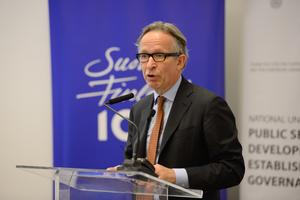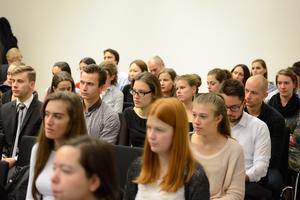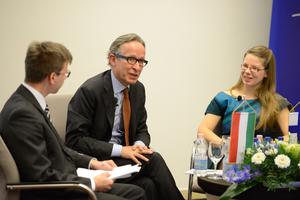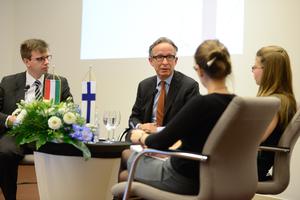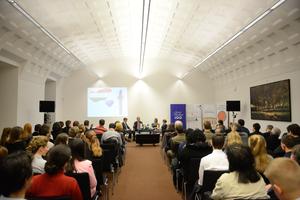The Ambassador’s Forum at Ludovika series continued with Finland on 20 November. The last special guest of the autumn semester was HE Petri Tuomi-Nikula, Ambassador Extraordinary and Plenipotentiary of Finland to Hungary, who delivered a presentation on "Finland & Hungary – a 200 year old love story. Now in the same EU-family!"
His Excellency is fulfilling his position since 2016 and in addition to Hungary, he also represents his country in Slovenia. He acquired his Master degree in Political Sciences, Political History at the University of Helsinki, then in 2012 he worked at the Columbia University, US as Visiting Researcher. During his career he had assignments in Bonn, Vienna and London. Between 2010-2015 before arriving to Budapest, he was the Ambassador of Finland accredited to the Republic of Italy, Malta and San Marino. Besides his diplomatic career, he gained experience in journalism and communication. He also succeeded in business due to his years spent at Fujitsu as Director of Marketing, Investments and Communications.
At the beginning of his speech, His Excellency thanked the opportunity to present at this well-known event and he highlighted that he was the first Finnish ambassador to do that. In line with his presentation title, HE Petri Tuomi-Nikula described the Finnish-Hungarian relations from the 1800s until present day. He started with emphasizing that the Finnish-Hungarian relationship - and friendship - is not only about the great relationship, but it is also an important element of the fact that the two nations can stand together with other countries and can determine their origins.
Because of his vaste knowledge in history, His Excellency included maps and colorful illustrations in his presentation to show on a linear timeline the key moments of the bilateral relation. Before going into the details, he also dedicated a few moments to present Finland to those who may not know this stunning northern state. The audience could learn that although the modern Finnish state has been independent for only 100 years, their history dates back thousands of years. At the moment, however, the Finns are known about the great education, innovation and successes in sports. As the Ambassador said: "The Finns are good in all sports that require helmet. Whether it’s car racing or even hockey!"
Beside the sport successes, the audience heard about the geography of the country. One third of of Finland's territory lies within the Arctic Circle, thus the majority of the population is concentrated in the southern region. This region hosts the capital of Finland, Helsinki, which is one of the most strategic center in the Baltic Sea. The city is only 350 kilometers from St. Petersburg and only 80 kilometers from Estonia's capital, Tallinn. Today, Helsinki has one of the world's largest seaports in the world with approximately 5.5 million passengers a year. In addition, Finns are the winners of globalization from aviation perspective as Helsinki is an important hub for air travel to Asia through the Arctic Circle. Apart from distant countries, they certainly established closed relationship with their neighbours. The capital maintains a very closed relationship with Stockholm and Tallin and as a result of this, Finland and the Estonian capital are planning to build the world's longest 80 km long sea rail tunnel to promote even an even smoother traffic.
In the second part of the presentation, the audience could hear a few interesting facts about Finnish history. The history of the Fins – just like of the Hungarians – had been closely linked to that of their western neighbours for centuries. Finns had lived under Swedish rule for a long time, and the Swedish language is still one of the official languages in the country. With the Reformation, they followed Luther’s teaching, and Michael Agricola, who was one of Luther’s students himself, translated the Bible into Finnish, thus creating the foundation of Finnish literature. Later, following the Napoleonic Wars, Finnish people came under Russian rule, but the liberal and enlightened czar of the time allowed them to remain largely independent. Only their foreign policy was controlled by the Russian Empire. This connection lasted until the 6th of December 1917, when the Finns declared independence.
Turning back to the question of Finnish-Hungarian relations, Petri Tuomi-Nikula shared a few thoughts about the linguistic affinity between the two languages too. Although both stem from the same ancestor, nowadays they are really different.
„Finns perceive Hungarian as if it was Finnish spoken backwards. The intonation is the same, but the words are not. I think that you have the same feelings when hearing Finnish”, explained His Excellency.
Finally, Petri Tuomi-Nikula mentioned a few milestones, which influenced bilateral relationships in the past, and moulded this current good understanding. First of these was the Hungarian revolution of 1848, something the Finns followed closely. Also important was the second part of the XIX. Century, when the civilian societies found each other, many bilateral relationship developed, especially after 1867. The Winter War of 1939 was also important, and this time it was the Hungarians who helped their Nordic brothers. The Finnish repaid this help with aid in 1956, and Finland also did everything it could to help Hungary integrate into Europe and joint the European Union. The ambassador stressed in his final remarks that the Finnish-Hungarian friendship has been unwavering for more than 200 years. In spite of some politicians, who tried to undermine this, two World Wars, and the Iron Curtain the two nations has always supported one another.
According to the traditional conduct of the Ambassadors’ Forum at Ludovika, the lecture was followed by a roundtable discussion. As usual, the moderator was Dr. János Bóka, lecturer of NUPS, while the expert guests included Dr. Laura Bába, assistant lecturer at the Department of Finno-Ugric Studies of the Eötvös Lóránd University, and Hajnalka Módis, who has first-hand experience about the Finnish tertiary education system. The main topic of the conversation was mostly centred on the high quality Finnish school system, which is worthily considered to be one of the best in the world, and which provides equal opportunities for every child. As customary, the whole evening concluded with a standing reception, where the participants could continue the discussion in a relaxed atmosphere.
